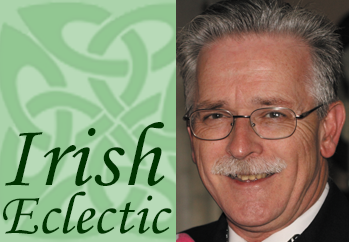The Famine Irish, Music Festivals and Seisiún Favorites
Opinion Advocates for ideas and draws conclusions based on the author/producer’s interpretation of facts and data.
 By Brian McGowan
By Brian McGowan
Were the “Famine Irish” the lawless, illiterate and ignorant louts portrayed in popular media such as “The Gangs of New York?” Or do they deserve better treatment?
They do, argues award-winning historian Tyler Anbinder.
His fourth book, “Plentiful Country – The Great Potato Famine and the Making of Irish New York,” paints a different portrait than most of the starving masses who escaped Ireland in those bitter years, victims of one of the saddest events in Irish history, the Great Famine of 1845-1851. His research digs deeper than most, and finds that most of the Famine immigrants – those who arrived both during the Famine itself and in its immediate aftermath – were as hard-working, honest and ambitious as those native-born Americans who feared their arrival on our shores would bring the country to ruin.
Anbinder knows his subject. He is the author of three other books on the immigrant experience: “Nativism and Slavery,” an examination of the “Know Nothing” movement of the 1850s; “Five Points,” which explores the notorious lower Manhattan neighborhood where many of the Irish Famine immigrants first made their home; and “City of Dreams,” which studies the entire history of immigration in New York.
For the Famine Irish – as for many immigrant populations, both then and now – New York was the promised land. Of the 1.3 million Irish who fled to America during this time, almost one million landed in New York. They quickly discovered that the streets were not paved with gold. Settling in on the lowest rungs of the economic ladder, they found themselves in competition with others for a handhold on the American dream.
Most accounts, unfortunately, portray them as almost permanently stuck there. Caricatures and stereotypes abounded, and for many were – and continue to be – accepted as gospel.
Anbinder’s research rebukes this notion. He follows the path of many Famine immigrants where records for the remainder of their lives in America can be found. Their documented histories reveal that many of them rose steadily from “have not” to “have,” a path the generations descended from them continue to tread.
True, there were black marks, such as the Draft Riots of 1863, and the often-vicious gangs that poverty spawned among the ranks of those less industrious than their peers. These were more the exception than the rule. The Famine Irish, and the immigrant waves that followed them, contributed greatly to America, and particularly to New York.
One thing all Irish immigrants never left behind was a love of their traditional music. There are several upcoming opportunities to savor it. And pick up Anbinder’s book. You will not be disappointed.
‘Rising of the Moon’ Irish Music Seisiún
This Thursday, Sept. 19 will see another gathering of the Rising of the Moon Seisiún at Sláinte, 21 S. Division St. in Peekskill. Music will start at 7:30 p.m. This is an “open” seisiún, so all musicians are welcome to join in.
Thursday night dates for the rest of the year are Oct. 17, Nov. 21 and Dec. 19. A special Saturday performance will kick off the Hudson Valley Irish Fest (see below) on Sept. 28 at 11 a.m.
Hudson Valley Irish Fest
On Saturday, Sept 28, from 11 a.m. to 7 p.m., Peekskill’s Riverfront Green will be the site of the annual Hudson Valley Irish Fest. For a modest $10 admission, guests will be able to enjoy fine Irish music, dancers and pipers both on the main stage and during the ongoing seisiún that takes place in the traditional music tent. There will be numerous merchandise, food and beverage vendors.
For more information, visit https://www.hudsonvalleyirishfest.com.
McNeela’s ‘Friday Five’
For those looking to expand their repertoire of Irish traditional music, or just wish to learn more about the genre, you cannot do better than Paraic McNeela’s weekly “Five Tune Friday” offering of favorite seisiún tunes.
Paraic, proprietor of McNeela Music in Dublin (https://mcneelamusic.com), is a world-renowned maker of every imaginable instrument in the Irish trad world. Every Friday he sends out an e-mail with five favorite seisiún tunes, each with a link to a YouTube performance, as well as notation as it appears on www.thesession.org, another favorite repository of Irish traditional music.
Pick up a new tune, master an old and soon you’ll be in the thick of it, delighting yourself and other afficionados of “trad.”
Longtime Pleasantville resident Brian McGowan was born and raised in the Bronx and is a second-, third- and fifth-generation Irish-American/Canadian, as his immigrant ancestors followed several paths to the New World. Reach him at brian.m.mcgowan1952@gmail.com. He is the author of three books: “Thunder at Noon,” about the Battle of Waterloo; “Love, Son John,” about World War II; and “Island Prize,” about the Revolutionary War in 1776 New York. All are available at Amazon.com.

Examiner Media – Keeping you informed with professionally-reported local news, features, and sports coverage.
